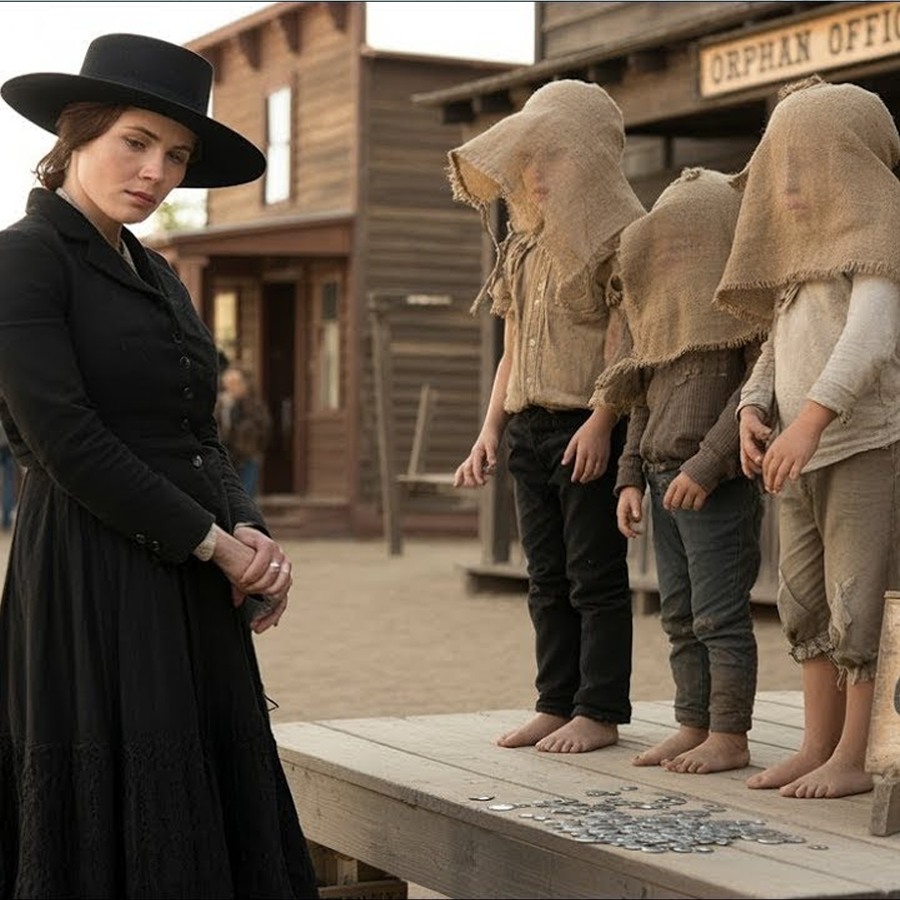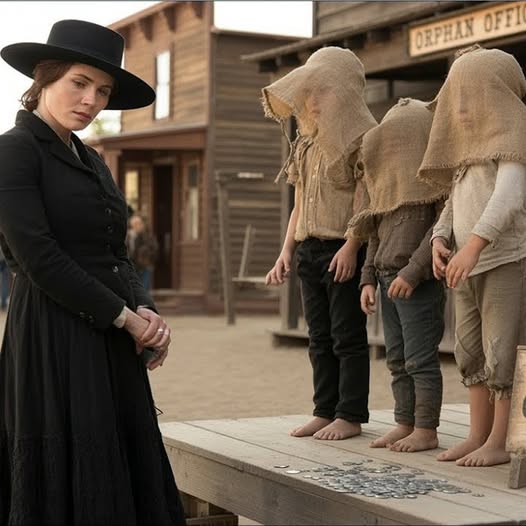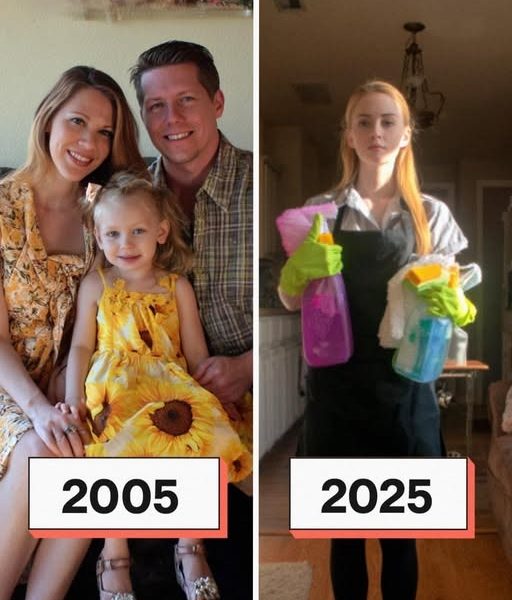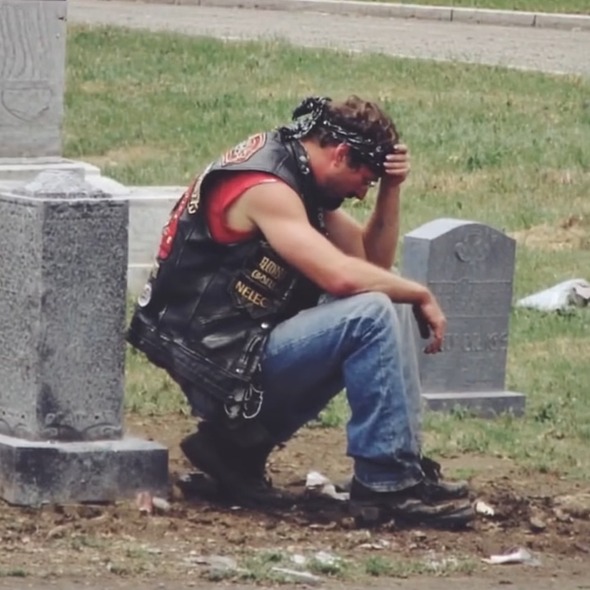That day, Marta Langley had no reason to stop in town. She didn’t need any food, nails, or anything else to make the diversion worth it. But the wind changed, and something about that change—more of a sense than a thought—made her urge her horse toward the plaza.
Then she spotted them: three kids standing still with their hands tied behind their backs and bags over their heads. There was a hand-painted sign at their feet that proclaimed, “Orphans!” No name, no age. Marta got off the trolley and didn’t say anything. She stomped on the ground with the vigor of someone who never asks for permission. No one saw her at first.
She was a quiet widow who came and went without saying hello. This time, though, she walked right up to the gathering, and something in her eyes made everyone look. The auctioneer, a man with a red face and short suspenders, coughed in a way that was unusual. “Ma’am, do you want one?” She didn’t answer; she just got closer. The oldest of the three youngsters, who was perhaps eleven or twelve, was a little shaky but stayed strong.
There was a black eye on the one in the middle. The six-year-old, who was the youngest, turned his head to look at her. The auctioneer kept talking in a way that made him sound scared. “They don’t know how to do it.” They don’t talk a lot. They don’t cry. Since morning, they haven’t eaten anything. Don’t untie them; it can make things worse. They might not even talk. I’m just saying. “You don’t know what you’re getting.”

Marta didn’t say anything. She reached into her coat pocket, took out her old leather pocketbook, and without thinking, gave the auctioneer silver coins. “All three,” she said simply. The square was quiet. The man said “Pardon?” again, not understanding. She nodded her head. “Let them go.” The crowd held their breath.
The auctioneer swallowed hard, pulled out a knife, and sliced off the bags one by one. The eldest person’s eyes were pallid and as stiff as ice. The second person didn’t even look at anyone. “Mrs. Langley,” the youngest child said with great confidence after the cloth was gone. It wasn’t fear or shock; it was something much more personal: recognition.
Someone in the crowd said, “How does he know her?” But Marta didn’t say anything. She laid her hand on the shoulder of the youngest boy, then the middle boy, and finally the oldest boy. “Come with me,” she urged. The person running the auction tried to tell her. “You don’t even know who they are.” She said, “I don’t need them,” and then she departed.
They rode in silence. Marta was in front, and the three kids were at the back of the cart with their knees pulled up to their chests and their eyes on the road. No one asked where they were going or said anything, and she didn’t provide any comfort. Not yet, because Marta Langley knew something that most people forget: displaying love too quickly can hurt someone who has been hurt deeply.
The trees grew tall, and the brook was chilly between the stones at the bottom of the valley where her home lay. The house wasn’t very nice, and it wasn’t even close to being new. The windows hadn’t been cleaned in months, and the barn was leaning. But it was hers. And it was still there. She stopped the cart in front of the porch when they got there. She said “inside” in a soft voice that no one else could hear.
The oldest person was the first to jump. He didn’t say anything or protest as he helped the other two. They came in like ghosts, with quiet steps and gaze on the ground. The stove still had the heat from the morning inside. Marta turned on the stove and placed water on it to boil.
She then took out a bag of flour and a container of dried beans and began to prepare something with steady hands. “Sit,” she said. Without saying anything, the students did what they were taught. While she stirred the concoction, she kept an eye on them. She could tell everything she needed to know by the way they stood and breathed: they were scared, fighting back, and on guard. But there was also a spark of something else, like hope or something that was just starting to look like it.
She said to the youngest, “What’s your name?” He thought about it for a second and then said, “Milo.” She nodded. “And what about you?” “Aris,” said the middle one without looking up. She questioned the oldest, “And you?” He said “Beck” without blinking. She turned back to the pan and talked while she used a spoon to ladle the mixture. “Hi, I’m Marta.” You called me Milo. How did you learn? He shrugged. “I just knew.”
“Did someone tell you about me?” “Did we meet before?” she said again. The boy looked her in the eye. He was too young to lie, but there was something sincere about what he said. “I heard it in my sleep.” That was what a woman stated. She said, “Marta Langley will come.” “She will take you home.”
After Milo spoke, the kitchen was very quiet. Marta didn’t answer right away. Inside, something constricted because those were the same words she had whispered alone on her knees at her husband’s grave: “Let someone need me again.” Let someone pronounce my name. A child had said it without being asked, and that shook her more than anything else that had happened.
Beck got nervous. “I don’t care how he knew your name,” he said coldly. “But if you want to hurt us, do it now.” Don’t let it last. Marta cautiously turned her back on the stove. “I won’t hurt you.” “That’s what everyone says.” She didn’t say anything; she just flipped the pancakes. “Then I won’t say it again.”
She served them without any trouble. They ate like they weren’t sure if they would receive another meal. There was no talking, only the sound of forks scratching against each other, bread crunching, and a tense peace in the air. When they were done, Marta brought out the blankets and set them by the fire.
“You’ll be sleeping here tonight.” There are some clean clothing in the chest. It sounded like she was telling them what to do, not begging them to come. She said, “I won’t chase you if you run.” “But I’ll leave the light on for you if you want to come back.” She climbed the stairs, but she stopped at the first step. “Tomorrow we’ll talk about what’s next,” she stated without turning.
That night, no one got a full night’s sleep. Not them, not her. Milo’s comments from that strange night kept coming back to her like a prophecy or an answered prayer. At some point, Marta started to mumble softly, almost without meaning to, “Let someone say my name again.”


